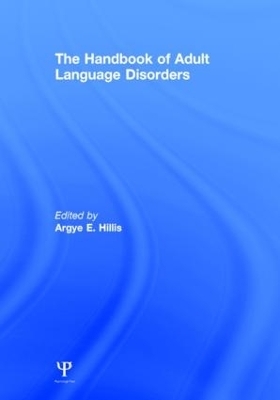
The Handbook of Adult Language Disorders
Psychology Press Ltd (Verlag)
978-1-84872-685-7 (ISBN)
The Handbook of Adult Language Disorders is the essential guide to the scientific and clinical tenets of aphasia study and treatment. It focuses on how language breaks down after focal brain damage, what patterns of impairment reveal about normal language, and how recovery can be optimally facilitated. It is unique in that it reviews studies from the major disciplines in which aphasia research is conducted—cognitive neuropsychology, linguistics, neurology, neuroimaging, and speech-language pathology—as they apply to each topic of language. For each language domain, there are chapters devoted to theory and models of the language task, the neural basis of the language task (focusing on recent neuroimaging studies) and clinical diagnosis and treatment of impairments in that domain. In addition, there is broad coverage of approaches to investigation and treatment from leading experts, with several authors specializing in two or more disciplines. This second edition focuses on characterizing the cognitive and neural processes that account for each variant of aphasia as a first step toward developing effective rehabilitation, given that aphasia is one of the most common and disabling consequences of stroke.
The best and most authoritative handbook in the field, The Handbook of Adult Language Disorders is the definitive reference for clinicians and researchers working in the scientific investigation of aphasia.
Argye E. Hillis is a Professor of Neurology, with joint faculty appointments in Physical Medicine and Rehabilitation and in Cognitive Science at Johns Hopkins University. Dr. Hillis serves as the Executive Vice Chair of the Department of Neurology, and Director of the Cerebrovascular Division of Neurology. Prior to medical training and neurology residency, she trained in the fields of speech-language pathology and cognitive neuropsychology, spent a decade in rehabilitation of aphasia, and conducted clinical research focusing on understanding and treating aphasia. Her current research combines longitudinal task-related and task-free functional imaging and structural imaging from the acute stage of stroke through the first year of recovery, with detailed cognitive and language assessments to improve our understanding how language and other cognitive functions recover after stroke. Her other avenue of research involves developing novel treatment strategies for aphasia.
Part 1: Reading 1. Acquired Impairments in Reading Jeremy J. Purcell, Teresa M. Schubert, and Argye E. Willis 2. Neuroanatomical Aspects of Reading Kyrana Tsapkini and Argye E. Hillis 3. Clinical Diagnosis and Treatment of Reading Disorders Rhonda B. Friedman and Susan Nitzberg Lott Part 2: Spelling 4. Uncovering the Cognitive Architecture of Spelling Brenda Rapp and Simon Fischer-Baum 5. Neuroanatomical Correlates of Spelling and Writing Steven Z. Rapcsak and Pélagie M. Beeson 6. Clinical Diagnosis and Treatment of Spelling Disorders Pélagie M. Beeson and Steven Z. Rapcsak Part 3: Naming 7. The Cognitive Processes Underlying Naming Donna C. Tippett and Argye E. Hillis 8. The Neural Mechanisms Underlying Naming David Race and Argye E. Hillis 9. Clinical Diagnosis and Treatment of Naming Disorders, Anastasia M. Raymer Part 4: Semantics 10. Semantic Memory Elaine Funnell and Bonnie Breining 11. Neural Substrates of Semantics Rajani Sebastian and Argye E. Hillis 12. Diagnosis and Treatment of Semantic Impairments Sofia Vallila-Rohter and Swathi Kiran Part 5: Auditory Discrimination and Recognition 13. Models of Speech Processing Michael Grosvald, Martha W. Burton, and Steven L. Small 14. Neurobiological Bases of Auditory Processing Deepti Ramadoss and Dana Boatman 15. Diagnosis and Treatment of Auditory Disorders Stephanie Nagle, Deepti Ramadoss, and Dana Boatman Part 6: Sentence Processing 16. Sentence Comprehension Deficits: Independence and Interaction of Syntax, Semantics, and Working Memory Randi C. Martin and Yingying Tan 17. Models of Sentence Production Cynthia K. Thompson, Yasmeen Faroqi-Shah, and Jiyeon Lee 18. The Neural Basis of Syntactic Processing: A Critical Review David Caplan 19. Assessment and Treatment of Sentence Processing Disorders Jane Marshall Part 7: Other Types of Models and Treatment Approaches 20. How Can Connectionist Cognitive Models of Language Inform Models of Language Rehabilitation? Nadine Martin, Matti Laine, and Trevor A. Harley 21. Biological Approaches to Treatment of Aphasia David A. Llano and Steven L. Small 22. Transcranial Direct Current Stimulation and Aphasia Therapy Post Stroke Jenny Crinion 23. A Focus on Life Participation Jacqueline J. Hinckley and Audrey L. Holland 24. The Nature and Implications of Right Hemisphere Language Disorders Connie A. Tompkins, Chia-Ming Lei, and Alexandra Zezinka 25. Prosody and the Aprosodias Donna C. Tippett and Elliott Ross
| Erscheint lt. Verlag | 21.5.2015 |
|---|---|
| Zusatzinfo | 27 Tables, black and white |
| Verlagsort | Hove |
| Sprache | englisch |
| Maße | 178 x 254 mm |
| Gewicht | 1179 g |
| Themenwelt | Geisteswissenschaften ► Psychologie ► Allgemeine Psychologie |
| Geisteswissenschaften ► Psychologie ► Biopsychologie / Neurowissenschaften | |
| Geisteswissenschaften ► Psychologie ► Verhaltenstherapie | |
| Geisteswissenschaften ► Sprach- / Literaturwissenschaft ► Sprachwissenschaft | |
| Medizin / Pharmazie ► Gesundheitsfachberufe ► Logopädie | |
| ISBN-10 | 1-84872-685-6 / 1848726856 |
| ISBN-13 | 978-1-84872-685-7 / 9781848726857 |
| Zustand | Neuware |
| Haben Sie eine Frage zum Produkt? |
aus dem Bereich


